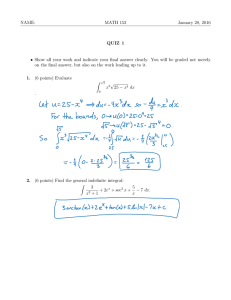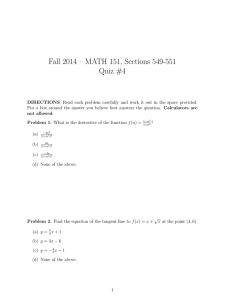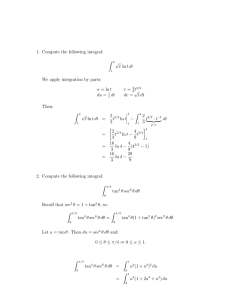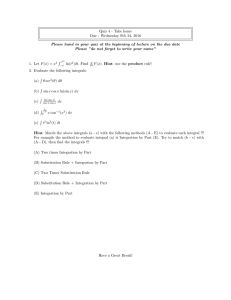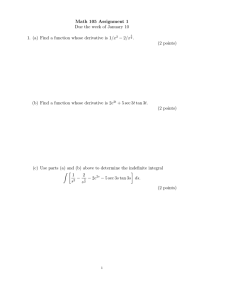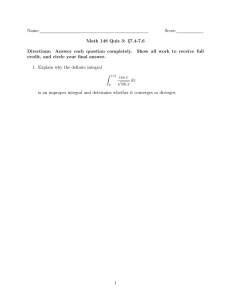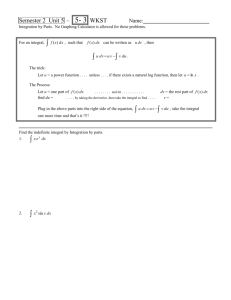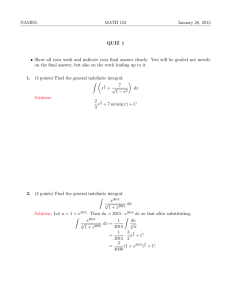MATH 101 MIDTERM 2 – SOLUTIONS 1. Evaluate the following integrals: A B
advertisement
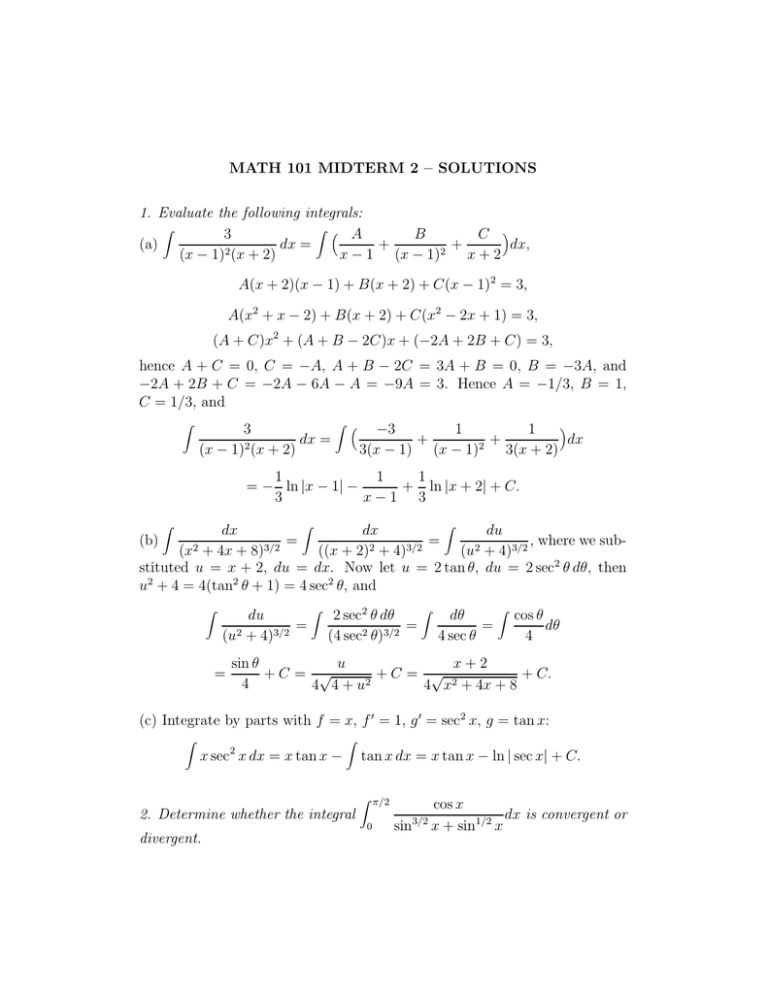
MATH 101 MIDTERM 2 – SOLUTIONS 1. Evaluate the following integrals: Z Z 3 A C B (a) + dx, dx = + (x − 1)2 (x + 2) x − 1 (x − 1)2 x + 2 A(x + 2)(x − 1) + B(x + 2) + C(x − 1)2 = 3, A(x2 + x − 2) + B(x + 2) + C(x2 − 2x + 1) = 3, (A + C)x2 + (A + B − 2C)x + (−2A + 2B + C) = 3, hence A + C = 0, C = −A, A + B − 2C = 3A + B = 0, B = −3A, and −2A + 2B + C = −2A − 6A − A = −9A = 3. Hence A = −1/3, B = 1, C = 1/3, and Z Z 3 −3 1 1 dx = + + dx (x − 1)2 (x + 2) 3(x − 1) (x − 1)2 3(x + 2) 1 1 1 = − ln |x − 1| − + ln |x + 2| + C. 3 x−1 3 Z Z Z dx dx du = = , where we sub2 3/2 2 3/2 2 (x + 4x + 8) ((x + 2) + 4) (u + 4)3/2 stituted u = x + 2, du = dx. Now let u = 2 tan θ, du = 2 sec2 θ dθ, then u2 + 4 = 4(tan2 θ + 1) = 4 sec2 θ, and (b) Z du = 2 (u + 4)3/2 = Z 2 sec2 θ dθ = (4 sec2 θ)3/2 Z dθ = 4 sec θ Z cos θ dθ 4 sin θ u x+2 +C = √ + C. +C = √ 2 2 4 4 4+u 4 x + 4x + 8 (c) Integrate by parts with f = x, f 0 = 1, g 0 = sec2 x, g = tan x: Z x sec2 x dx = x tan x − Z tan x dx = x tan x − ln | sec x| + C. Z 2. Determine whether the integral 0 divergent. π/2 sin 3/2 cos x dx is convergent or x + sin1/2 x Substitute u = sin x, du = cos x dx, then the integral above becomes Z 1 0 Z 1 du du ≤ . 3/2 1/2 u +u 0 u1/2 Since the second integral is convergent (1/2 < 1), the first one is also convergent. (If we substitute u2 = sin x instead, then with just a little more effort we can compute the exact value of the integral. It turns out to be π/2.) Z 3. Prove that the integral 0 ∞ e−2x dx is convergent and has value less than x2 + 1 1/2. We have x2 + 1 > 1 for all x > 0, so Z ∞ 0 e−2x dx < x2 + 1 Z ∞ 0 e−2x dx = − e−2x ∞ 1 = . 2 0 2 R 4. We want to evaluate numerically the integral 01 f (x) dx, given that f (0) = 1.0, f (1/6) = 1.1, f (2/6) = 1.2, f (3/6) = 1.4, f (4/6) = 1.7, f (5/6) = 1.8, f (1) = 1.8. Write out (but do not evaluate) the Simpson’s approximation S6 . We have n = 6, h = 1/6. Hence S6 = 1 (1.0 + 4 · 1.1 + 2 · 1.2 + 4 · 1.4 + 2 · 1.7 + 4 · 1.8 + 1.8). 3·6 5. We do not know the exact formula for the function f , but we can compute numerically its values as needed. We know that |f 00(x)| ≤ x2 + x + 2 for all x Z 2 f (x)dx using the midpoint approximation in [0, 2]. We want to evaluate 0 Mn , with accuracy 10−4 or better. How large does n need to be? We can take K = 22 + 2 + 2 = 8. Thus we need to have 8 · 23 8 ≤ 10−4 , n2 ≥ · 104 , n ≥ 2 24n 3 s 8 · 102 . 3
